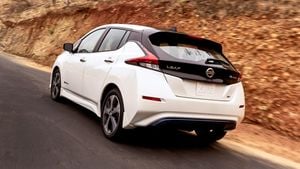The Tianzhou 8 cargo spacecraft, which launched on November 15, has successfully docked with China’s Tiangong space station, marking another step forward for the nation’s ambitious space program. Launched atop the Long March 7 Y9 rocket from the Wenchang Space Launch Center located on Hainan Island, the Tianzhou 8 cargo ship lifted off at 11:13 PM local time. Following its separation from the rocket just ten minutes later, the spacecraft entered its designated low-Earth orbit, with its solar panels unfurling successfully afterwards.
Designed to support China's Shenzhou 19 astronauts currently aboard the Tiangong space station, the Tianzhou 8 carries around six tons of supplies meant for both living and operational needs. Importantly, this latest cargo delivery includes provisions for the astronauts’ upcoming Spring Festival celebrations, highlighting China's commitment to maintaining traditions even aboard its orbiting station.
Three hours post-launch, the Tianzhou 8 successfully docked at the rear docking port of Tianhe, the core module of the Tiangong facility. It became the fifteenth spacecraft to visit the Tiangong space station. Astronaut Cai Xuzhe was first to enter the cargo ship early on November 16, initiating the transfer of supplies. The cargo encompasses consumables for the astronauts' stay, propellants, equipment for experiments, and over 400 kilograms of scientific research materials.
This resupply mission is not just about basic needs; it also paves the way for conducting pivotal scientific research. The supplies will support 36 experiments across various disciplines such as biotechnology, materials science, and microgravity physics. Specifically, the Tianzhou 8 mission will allow researchers to investigate the impacts of microgravity on biological processes—a study of significant importance as humanity prepares for long-term space habitation.
According to Liu Wei from the Chinese Academy of Sciences, among the experiments is one focused on the effects of microgravity on the behavior and reproduction of fruit flies. This will be the first foray of its kind aboard the space station. "These projects aim to deepen our knowledge of how environmental factors affect life processes," Liu explained, emphasizing the relevance of these studies to future human health and survival strategies in space.
With the steady progress of China’s space endeavors, the Tianzhou 8’s arrival and subsequent supply transfer to the Shenzhou 19 crew adds to the growing portfolio of China's successful space missions. Earlier, the Tianzhou 7 cargo ship had played its part before undocking and commencing its return to Earth, ensuring the continuous operation of this national initiative.
The Chinese Tiangong space station orbits Earth at approximately 400 kilometers, encompassing the Tianhe core module along with two accompanying laboratories, where astronauts regularly conduct scientific research and perform technical demonstrations.
The Tianzhou 8 mission also reinforces China’s status as an ascending power in the global space race. It reflects the country's strategic objectives not just to explore the cosmos but to gain insights which might benefit Earth, including advancements in technology for spacecraft and materials for future missions potentially beyond our planet.
While the Tianzhou 8 mission emphasizes the immediate goals of providing supplies and supporting astronauts, it simultaneously lays down groundwork for long-term scientific exploration and international collaboration in space research. The knowledge accrued from ventures like this one will be integral as nations prepare for even more ambitious space missions, including the establishment of lunar bases and exploratory missions to Mars.
China's growing presence in space science is evident not only from its technological capabilities but also from its commitment to sharing knowledge gained through these missions. The lessons and technologies developed will likely shape collaborative efforts with other countries, underscoring the importance of diplomatic engagement through science.
Overall, the successful Tianzhou 8 cargo mission to the Tiangong space station is another step forward for China's space ambitions, presenting both immediate benefits for its astronauts and long-term insights for humanity’s endeavors beyond Earth.



